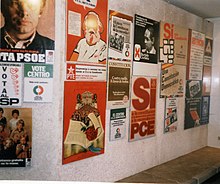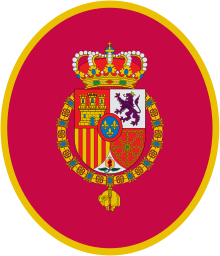Constitution of Spain
The promulgation of the constitution marked the climax of the Spanish transition to democracy after the death of general Franco, on 20 November 1975, who ruled over Spain as a military dictator for nearly 40 years.This led to the country undergoing a complex process that included a series of political, social and historical changes, gradually transforming the Francoist regime into a democratic state.The Constitution was redacted, debated and approved by the constituent assembly (Spanish: Cortes Constituyentes) that emerged from the 1977 general election.The seven people were chosen to represent the wide (and often, deeply divided) political spectrum within the Spanish Parliament, while the leading role was given to then ruling party and now defunct Union of the Democratic Centre (UCD).The members included: The writer (and Senator by Royal appointment) Camilo José Cela later polished the draft Constitution's wording.[citation needed] The constitution was approved by the Cortes Generales on 31 October 1978, and by the Spanish people in a referendum on 6 December 1978.Constitution Day (Spanish: Día de la Constitución) on 6 December has since been a national holiday in Spain.It also supersedes the Law of 4 January 1977, on Political Reform, which was conceived as a temporary mechanism to loosen restrictions on fundamental rights inherited from the Francoist period.Consequently, the Cortes approve and the Spanish people ratify the following Constitution.As a result, Spain is now composed entirely of 17 Autonomous Communities and two autonomous cities with varying degrees of autonomy, to the extent that, even though the Constitution does not formally state that Spain is a federation (nor a unitary state), actual power shows, depending on the issue considered, widely varying grades of decentralization, ranging from the quasi-confederal status of tax management in Navarre and the Basque Country to the total centralization in airport management.Scholars deem the enumeration open insofar as new rights can be included under the principle of human dignity as a foundation of the political order and social peace (Section 10).[3] In addition to this, they are a binding principle for all public authorities, which allows for peaceful coexistence and legitimates the political and social order.This section is entrenched, meaning it is extremely difficult to modify or repeal, in order to prevent the establishment of a legal dictatorship via constitutional amendment.[9][10] The fundamental rights and public freedoms included in Section One of Chapter Two can be invoked directly, and they ought to be regulated by means of Organic Law (which ensures greater political consensus).[11] Section 54 calls for the creation of an Ombudsman (Defensor del Pueblo), accountable to the legislative power, the Cortes Generales.[12][13][14] In addition to this, the Prime Minister, the Ombudsman, 50 members of the Congress of Deputies, 50 Senators, and regional governments and legislative assemblies may lodge unconstitutionality appeals before the Constitutional Court.The monarch is also the highest-ranked representative of the Spanish state in international relations and only exercises the functions that are explicitly attributed to him by the Constitution and the laws.Article 62 of the Spanish Constitution establishes an exhaustive list of the King's functions, all of which are symbolic and do not reflect the exercise of any political power.Regarding the Government, the King also formally issues the governmental decrees, as well as bestowing all the civil and military ranks and employments, and he also grants honors and distinctions according to the laws.This legal forecast was exercised for the first time of the current democratic period in 2014 when King Juan Carlos abdicated in favor of his son.The Regency is a period in which a person exercises the duties of the King or Queen regnant on behalf of the real monarch who is a minor.This article establishes that the King or Queen's mother or father shall immediately assume the office of regent and, in the absence of these, the oldest relative of legal age who is nearest in succession to the Crown.Joint sessions of the Cortes are presided by the Speaker of the Congress of Deputies under a common procedure code passed by a majority of each chamber.Section 97 vests the executive power in the Government of Spain, which runs the country's domestic and foreign policy, the civil and military administration and the national defense.After an election, or any other event that triggers an appointment, the King shall meet with all the leaders of the political groups in the Cortes Generales, then choose one of them to face an investiture vote.Section 101 states that the Government is dismissed after a general election, the loss of supply or confidence of the Congress of Deputies, or the resignation or death of the Prime Minister.Section 102 stablishes the conditions for prosecution of criminal accountability for the Prime Minister or any other member of the Government, explicitly stating they cannot pardon themselves.Since the constitution of Spain was adopted, the state of alarm was only declared twice: once in 2010 for the Spanish air traffic controllers strike, and in March 2020 for the COVID-19 pandemic.[27][28] On October 27, 2017, the Senate of Spain (Senado) voted 214 to 47 to invoke Article 155 of the Spanish Constitution over Catalonia after the Catalan Parliament unilaterally declared independence.Article 155 gave Spanish Prime Minister Rajoy the power to remove secessionist politicians, including Carles Puigdemont, the Catalan leader, and directly rule from Madrid.[citation needed] Amnesty International has still requested an amendment to be made to the Constitution to abolish it firmly and explicitly in all cases.






List of constitutions of SpainRatifiedDate effectiveSystemParliamentary monarchyBranchesHead of stateChambersBicameralExecutiveGovernmentJudiciarySupreme Court of SpainAudiencia NacionalHigh courts of justiceCourt of AuditorsProsecution MinistryAmendmentsCongress of DeputiesFathers of the ConstitutionGabriel Cisneros LabordaMiguel Herrero y Rodríguez de MiñónJosé Pedro Pérez-Llorca RodrigoGregorio Peces-Barba MartínezJordi Solé TuraManuel Fraga IribarneMiquel Roca i JunyentWikisourcePolitics of SpainConstitutionConstitutional CourtPresidentCándido Conde-PumpidoConstitutional historySpanish transition to democracyHuman rightsTaxationAbortionNationalityCapital punishmentLife imprisonmentThe CrownRoyal HouseholdThe MonarchFelipe VIHeir presumptiveLeonor, Princess of AsturiasRoyal familySuccession to the Spanish throneGovernment of the NationPrime MinisterPedro SánchezDeputy Prime MinisterMaría Jesús MonteroYolanda DíazsecondTeresa RiberaCouncil of MinistersSánchez III GovernmentMinistriesGovernment DelegationsGovernment Delegated CommitteesInterministerial CommitteesSpanish prime-ministerial transitionList of agencies in SpainCouncil of StateEconomic and Social CouncilLegislatureCortes Generales15th Cortes GeneralesSenate15th SenateSpeakerPedro Rollán15th CongressFrancina ArmengolParliamentary groupsPermanent DeputationBureaus of the Cortes GeneralesBoard of SpokespersonsPeople's Defender (ombudsman)Solemn Opening of the Parliament of SpainGeneral Council of the JudiciarySupreme CourtIsabel PerellóVice PresidentFrancisco Marín CastánEuropean Central BankBank of SpainGovernor of the Bank of SpainPablo Hernández de CosRoyal Mint of SpainAdministrative subdivisionsAutonomous communitiesLegislaturesGovernmentsPresidentsProvincesComarcasMunicipalitiesPlazas de soberaníaElectionsPolitical partiesGeneral2019 (Apr)2019 (Nov)RegionalEuropeanForeign relationsDiplomatic missionsof Spainin SpainPolitics of the European UnionPodemosDictatorship of Francisco FrancoAnarchism in SpainLiberalism and radicalism in SpainSpanish Civil WarNationalisms and regionalisms of SpainBasqueCatalanGalicianCatalan independence movementSpanish constitutional crisis of 2017–18Disputed status of GibraltarRepublicanism in Spain